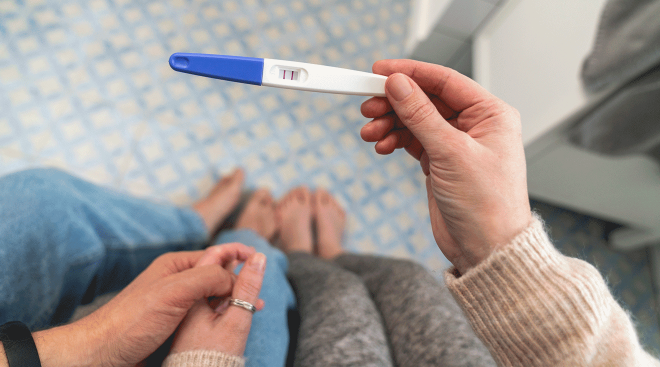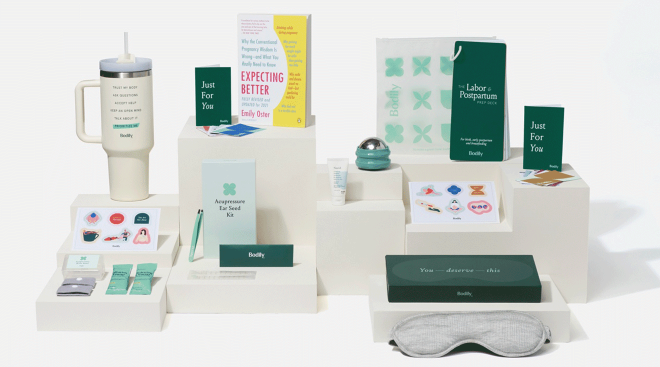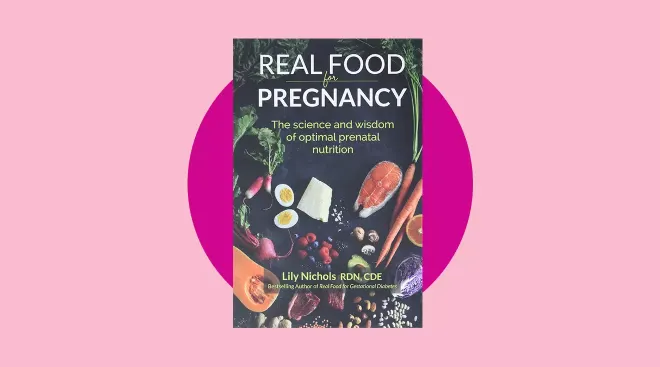16 Common Pregnancy Myths, Busted by Experts
Pregnancy can come with a barrage of do’s and don’ts. With all the pregnancy advice out there it’s hard to keep track of what’s actually safe and what’s not. So what should you believe? While there are some definitive no go’s (sorry, no hot tubs during pregnancy), other supposed no no’s are rooted more in myth than medical fact. Here, with the help of experts, we break down common pregnancy myths so pregnant people and moms-to-be can enjoy some of their favorite things, guilt-free. (Of course, every pregnancy is different, so follow your provider’s orders above anything else.)
Choosing to have a few sips during a champagne toast or abstaining from alcohol completely is ultimately a personal decision, but know that numerous studies have linked drinking during pregnancy with an increased risk of fetal alcohol spectrum disorders (FASDs). Both the Centers for Disease Control and Prevention (CDC) and ACOG say pregnant woman should completely avoid alcohol during pregnancy. “The birth defects associated with alcohol during pregnancy are completely preventable,” says Mark S. DeFrancesco, MD, an ob-gyn and former ACOG president. “It’s essential that all healthcare providers, especially ob-gyns, make clear to their patients that there’s no amount of alcohol use that’s safe during pregnancy.”
One of the biggests myths during pregnancy is that you can only drink decaf coffee. It’s true that caffeine crosses the placenta, meaning when you load up on lattes, both you and baby feel a buzz. But a small cup of coffee or tea a day is perfectly fine—in fact, ACOG says that having up to 200 milligrams of caffeine a day is considered safe. So how much coffee or tea does that buy you? It all depends on the type of drink and its caffeine content. Caffeine levels in coffee can vary widely based on the type of bean, how long it was roasted and how it was brewed. For instance, a French blend served black is much stronger than a weak cup of American coffee mixed with milk. Plus, watch out for certain types of food with caffeine (like chocolate). (Curious how much caffeine is in various types of coffees and teas? Our handy caffeine chart for pregnancy can help.)
Some good news: You don’t have to avoid all cheeses. Some kinds, like cheddar and Swiss, are totally fine because they’ve been pasteurized. It’s the soft, unpasteurized products like Brie, feta and goat cheese that might carry food-borne illnesses. Luckily, most American grocery stores only carry pasteurized versions—just be sure to confirm on the label. “The source of your food is always something to consider,” says Rebekah Mustaleski, CPM-TN, a certified professional midwife and compression director with Motif Medical. “Food handling and storage practices impact the safety of the foods you consume, so make sure you’re purchasing your food from a reputable seller.” As long as the cheese is handled safely and pasteurized, you can still enjoy your crackers with cheese. “In fact, cheese can be a wonderful source of calcium and protein during pregnancy,” Mustaleski adds.
This is one of the most common myths about pregnancy. Yes, the food cravings are real, and it’s okay to indulge every now and then, but you’ll still want to make nutritious choices while pregnant. “Eating for two would be overdoing it for any pregnant person,” Mustaleski says, adding, “I’ve often wondered if this pregnancy myth comes from the need to eat smaller meals more frequently during pregnancy.” If you’re truly still hungry, don’t shy away from a second helping, but keep in mind that on average, pregnant women need only about 300 extra calories (i.e. kcals) a day—and that too only in the second and third trimesters. “Depending on your pre-pregnancy eating habits and lifestyle, you may not need to adjust your eating habits much,” Mustaleski explains. “Even if someone is underweight, they only need to add 400 to 500 calories a day.” While it’s important to keep your body well-nourished—after all, it’s working hard to grow a baby!—you should aim for a nourishing pregnancy weight gain, which is about 25 to 35 pounds for people who were of average weight pre-pregnancy, according to the ACOG.
Another myth related to pregnancy? Saying bye-bye to fish. Seafood is actually very nutrient-dense and a great meal choice during pregnancy, as it’s packed with protein and omega 3 fatty acids, iodine, selenium and Vitamin D, Mustaleski says, all of which have major developmental benefits for baby. But not all fish is created equal, and you’ll want to make sure you’re choosing seafood with low mercury levels. The Food and Drug Administration (FDA) encourages moms-to-be to eat two to three servings (around 12 ounces) of low-mercury seafood every week. When perusing a menu, go with choices like salmon, shrimp and tilapia. Unfortunately, swordfish, bigeye tuna, tilefish, marlin, King mackerel, orange roughy and shark have the highest levels of mercury and should be skipped entirely. As for sushi, experts, including the FDA, urge pregnant women to steer clear of anything uncooked. Raw fish can contain parasites and bacteria that may lead to infections and foodborne illnesses, so your best bet is to stick with cooked sushi rolls, like tempura.
A common pregnancy myth is you need to put up with headaches and suffer through colds, but it’s not so. Of course, you should always consult with your provider before taking anything, but most over-the-counter medications are safe during pregnancy, Mustaleski says. “Some of them might be very helpful for you to take while you’re expecting,” she adds. Many experts give the following drugs the green light: Tylenol for headaches and fever; Tums or Mylanta for heartburn; Robitussin for colds; and Benadryl for allergies. Many prescription drugs are also okay to continue with during pregnancy, but, again, follow your provider’s orders.
Herbal supplements and teas, however, are up in the air—not much research has been done on their effects on baby. The kinds you buy in the grocery store are probably safe, but always check with your provider first.
Heard exercise isn’t good for you while expecting? This is another pregnancy myth. Many experts actually say that in most cases, low-impact workouts can be a great way to manage your health and prep your body for baby’s arrival. “Birth is a physical event, and moving throughout pregnancy helps get your baby in the best position for birth and creates balance and space for your baby to be born,” Mustaleski explains. Plus, it can help reduce your risk of developing complications gestational diabetes, preeclampsia, gestational hypertension and more, she adds.
ACOG recommends that pregnant women get at least 150 minutes of moderate aerobic activity in every week—“moderate” meaning your heart rate is raised and you’re starting to sweat, but you can still talk normally. Just avoid contact sports or exercises that involve lying on your back (which reduces blood flow to your brain and uterus). As the pregnancy progresses, you’ll likely need to modify to ensure you and baby remain safe and comfortable. Talk to your provider or a prenatal fitness expert about pregnancy-safe workouts you can incorporate into your routine for each trimester.
Being pregnant doesn’t have to compromise your hair appointments, but you do need to be smart about them. There is a theoretical risk associated with coloring your hair, as chemicals are absorbed through the scalp, but, according to the American Pregnancy Association (APA), the amount of dye absorbed is likely too small to truly affect baby. Plus, studies haven’t shown anything conclusive. To be safe, the organization does suggest avoiding dye for at least the first trimester, when baby’s organs are forming. Plus, choose ammonia-free products. Candice Wood, MD, an ob-gyn at the Banner University Medical Center Phoenix, suggests opting for a natural vegetable dye over a permanent product, going for something semipermanent and not leaving the treatment on for longer than necessary. Plus, whether you’re at a hair salon or at home, make sure the space is well ventilated.
You also don’t need to forgo weekly manis just because you’re pregnant, Mustaleski says—but you do need to pay attention to your air quality. To avoid breathing in fumes, choose places that are well ventilated. “The air quality in salons is often filled with toxic fumes and those aren’t the best for you during pregnancy,” she explains. Consider making your appointment for less crowded times of the day, or, as Mustaleski recommends, wearing a mask during your appointment. Most importantly, make sure the salon sterilizes all their tools. “If you were ever going to get an infection from a manicure, it would be when you’re pregnant,” Wood says.
If you’re concerned about the ingredients in the nail polish itself, look for brands that are at least 3-free, meaning they don’t contain dibutyl phthalate, toluene or formaldehyde, or 5-free, which also don’t contain formaldehyde resin and camphor. Some of these brands include Butter London, Essie and Zoya. These days many brands also make 7-free and 10-free polishes, which eliminate even more chemicals from the ingredients. (Wondering if you can indulge in other pampering services? Brush up on spa safety while pregnant.)
While you can absolutely travel in the third trimester, there are a few things to consider. According to Johns Hopkins Medicine, restrictions for air travel can start after 36 weeks for those traveling domestically and between 28 and 35 weeks for those traveling internationally. Plus, many providers recommend staying in a 300-mile radius of your home during that last trimester in case of complications, false labor or preterm labor. That said, traveling during the third trimester (and even earlier) will ultimately depend on many personal factors, including how comfortable you are, if your provider has any concerns based on complications or your conditions and if your airline has any restrictions on traveling during pregnancy. “While it’s unlikely to go into labor while you’re gone, I tell my clients to find the number for the local labor and delivery, just in case they do need to be seen while they’re gone,” Mustaleski says.
For most pregnancies, sex is totally safe and even encouraged as long as you and your partner feel up to it. There are a few instances, however, where your provider may advise against it, including if you have placenta previa, an active sexually-transmitted infection, are at an increased risk of miscarriage or preterm labor or have any cervical weakness, Mustaleski says. “Aside from that, you’re okay to have sex whenever you want.”
Remember that pregnant sex will likely feel a little different, and that’s totally okay. “You may find that some positions are more comfortable than others, and that’s a normal part of pregnancy, but it shouldn’t ever be painful to have sex. If it is, you’ll want to get in touch with your care provider,” Mustaleski says. And if you’re worried about baby knowing what’s going on–you’ll be pleased to hear this is another of the myths regarding pregnancy.
Of course, this one will ultimately depend on what feels right to you—what was good for you pre-pregnancy will likely be good for you now. But if you’re suffering from nausea or heartburn, your provider may recommend you actually eat four to five small, nutritious meals throughout the day, as opposed to three big ones. According to the American College of Obstetricians and Gynecologists (ACOG), eating smaller meals more frequently can help manage your symptoms while ensuring your stomach is never empty. Ultimately, listen to your body and eat as you feel hungry. And if you’re wondering what to eat while pregnant, here are some healthy items to add to your grocery list.
It was thought that lifting your arms above your head during pregnancy would wrap the umbilical cord around baby’s neck (known as nuchal cord), but this is another pregnancy myth. In fact, Mustaleski points out that lifting your arms overhead may actually offer some benefits, including expansion of the ribs and stretching your back and shoulder muscles, all of which can help ease the aches of pregnancy. (While nuchal cord does occur during pregnancy and labor, it doesn’t happen through lifting your arms. Plus, it’s usually not a cause for alarm, as the cord can be slipped off as long as it’s not wrapped tightly.)
While you don’t need to avoid cats while pregnant, you should avoid cleaning their litter boxes, Mustaleski says. This is because cat feces can have a parasite in them called toxoplasma. This can lead to an infection called toxoplasmosis, which can be harmful to pregnant women and their developing babies, leading to complications like blindness or even brain damage, per the CDC. If you do have cats, have your partner clean their litter boxes or wear gloves if you need to do it yourself and thoroughly wash your hands after.
You may have been told to avoid common allergens, like peanuts, wheat and cow’s milk, but the truth is restricting prenatal diet to avoid these foods doesn’t actually decrease baby’s risk of future food allergies, according to research and the American Academy of Pediatrics (AAP). In fact, the organization actually recommends early introduction of these allergens once baby’s born to help prevent such food allergies.
Whether or not this one’s a myth when pregnant is a toss up. While one 2006 study did find a slight correlation between heartburn in pregnancy and babies with higher than average amounts of hair, according to the University of Utah Health, most of the evidence to support this claim is anecdotal. Mustaleski notes that heartburn in pregnancy is more commonly likely to be caused by certain foods, as well as the “relaxing of the sphincter between your stomach and your esophagus”—but she also notes some of this myth might hold true. “Some of my clients only have heartburn when their baby has a lot of hair. I don’t know what hormones or mineral balances contribute to that, but there must be an explanation for it that we haven’t discovered yet.”
Please note: The Bump and the materials and information it contains are not intended to, and do not constitute, medical or other health advice or diagnosis and should not be used as such. You should always consult with a qualified physician or health professional about your specific circumstances.
Mark S. DeFrancesco, MD, is an ob-gyn with over 40 years of experience and a previous ACOG president. He earned his medical degree from the University of Connecticut School of Medicine.
Rebekah Mustaleski, CPM-TN, IBCLC, is a certified professional midwife specializing in evidence-based maternity care. She co-founded Roots & Wings Midwifery in Knoxville, Tennessee. Mustaleski received her bachelor’s degree in psychology from Centre College and worked as a doula and birth photographer prior to establishing Roots & Wings.
Candice Wood, MD, is an ob-gyn at Banner University Medical Center Phoenix. She earned her medical degree from University of Colorado Health Sciences Center and completed her residency training at Banner University Medical Center Phoenix.
American Pregnancy Association, Hot Tubs During Pregnancy
American College of Obstetricians and Gynecologists, Morning Sickness: Nausea and Vomiting of Pregnancy, October 2023
Centers for Disease Control and Prevention, Alcohol Use During Pregnancy, October 2023
American College of Obstetricians and Gynecologists, Alcohol and Pregnancy, February 2023
American College of Obstetricians and Gynecologists, How much coffee can I drink while I'm pregnant?, October 2020
American College of Obstetricians and Gynecologists, Weight Gain During Pregnancy, January 2013
Food and Drug Administration, Advice about Eating Fish, March 2024
American College of Obstetricians and Gynecologists, Exercise During Pregnancy, March 2022
American Pregnancy Association, Hair Treatment During Pregnancy
Johns Hopkins Medicine, Traveling While Pregnant or Breastfeeding
Centers for Disease Control and Prevention, Toxoplasmosis: Pregnancy FAQS, December 2022
Canadian Medical Association Journal, Maternal peanut consumption and risk of peanut allergy in childhood, July 2018
Healthy Children (American Academy of Pediatrics), AAP Clinical Report Highlights Early Introduction of Peanut-based Foods to Prevent Allergies, March 2019
Birth, Pregnancy folklore revisited: the case of heartburn and hair, December 2006
University of Utah Health, Heartburn and Infant Hair, April 2016
Learn how we ensure the accuracy of our content through our editorial and medical review process.
Navigate forward to interact with the calendar and select a date. Press the question mark key to get the keyboard shortcuts for changing dates.




















































